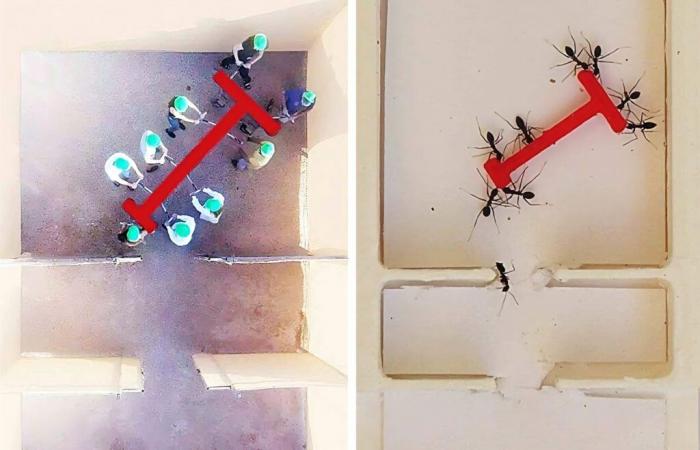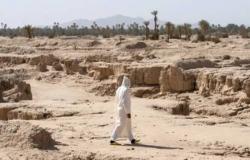Ants and humans share a unique ability to cooperate to carry loads much larger than themselves. A recent study compared their effectiveness through a maze with a load, revealing surprising results on collective decision-making.
Credit: Weizmann Institute of Science
Prof. Ofer Feinerman’s team designed an experiment to compare the performance of ants and humans in transporting a T-shaped load through a maze. This study, published in Proceedings of the National Academy of Sciencesexplores the dynamics of cooperation and group decision-making.
Participants, humans and ants, had to navigate through a space divided into three chambers connected by narrow passages. The ants, attracted by a fake food source, were tested in groups of different sizes, while the humans were recruited voluntarily for the competition.
The results show that humans outperform ants in individual problems due to their strategic planning ability. However, in groups, ants demonstrated superior efficiency, benefiting from collective memory and flawless coordination.
Human groups, on the other hand, did not show significant improvement in their group performance. When communication was restricted, their effectiveness even decreased, revealing a tendency to opt for short-term solutions rather than strategic ones.
This study highlights fundamental differences in how ants and humans cooperate. Ants, acting as a super-organism, show cooperation that far exceeds competition, unlike human groups.
The researchers used computer simulations and physical models to analyze the data, providing a new perspective on collective decision-making and the benefits of cooperation in nature.
This research opens avenues for understanding cooperation mechanisms for other species and could inspire innovative approaches in solving complex problems in groups.
What is collective memory in ants?
Collective memory in ants refers to their ability to share and use information to improve group performance. This memory allows ants to persist in one direction of movement and avoid repeating the same mistakes.
Ants communicate primarily through pheromones, chemicals that transmit information about food, dangers, and paths to follow. This chemical communication is essential for the coordination of complex tasks like charge transport.
Collective memory is an evolutionary advantage that allows ant colonies to function as a superorganism. Each ant contributes to the group’s memory, which improves the efficiency and survival of the colony.
This study shows that ants’ collective memory allows them to outperform humans in group tasks, highlighting the importance of cooperation in nature.
How do humans make decisions in groups?
Group decision-making in humans is influenced by several factors, including communication, power dynamics, and individual preferences. Humans tend to opt for solutions that seem beneficial in the short term, even if they are not optimal in the long term.
In this study, human groups were restricted in their communication to mimic that of ants. This restriction revealed a drop in performance, showing that communication is crucial for effective decision-making.
Humans also tend to choose ‘lowest common denominator’ solutions, which are acceptable to the majority but not necessarily the best. This can limit innovation and efficiency in complex tasks.
This research highlights the problems of human cooperation and the differences with other species, offering perspectives for improving group decision-making.






